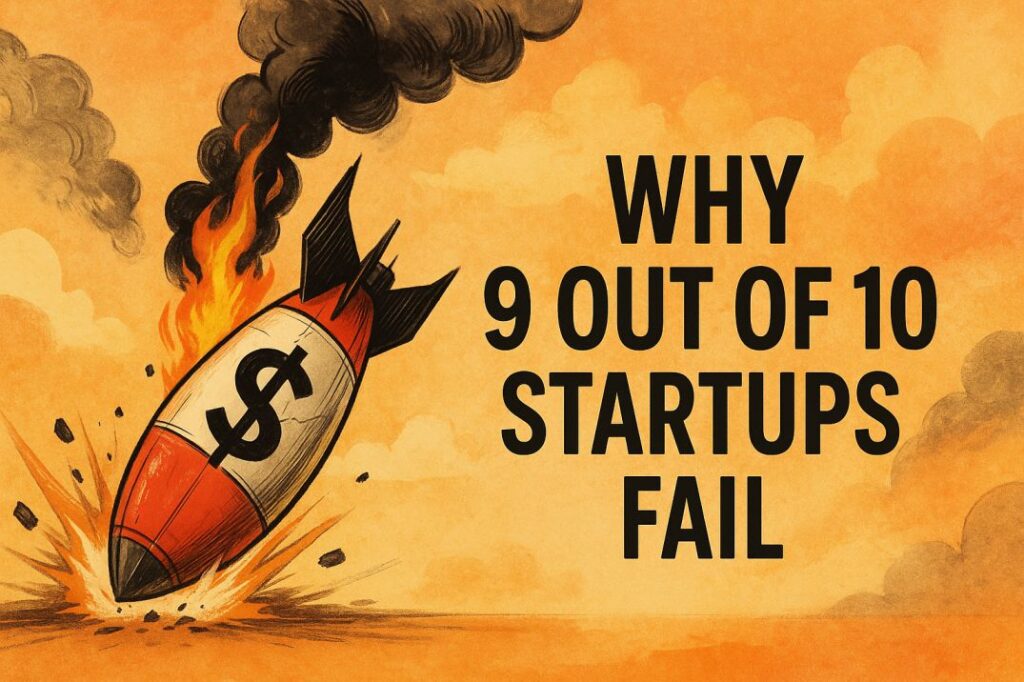Let’s be honest – launching a startup sounds sexy.
The late nights, the pitch decks, the hustle vibes, the “CEO” title in your LinkedIn bio. But reality hits differently. According to global stats (and very visible in our startup ecosystem too), around 90% of startups shut down within the first five years. That’s 9 out of every 10 dreamers walking away with lessons, not profits.
So, what actually goes wrong? Is it the idea? The team? The timing? Or just the universe having a bad day?
Let’s break this down. No corporate jargon. No MBA lingo. Just the real talk every aspiring entrepreneur needs to hear.
1. 🚫 Starting With a Cool Idea, Not a Real Problem
Mistake:
Founders often build something they think is cool, instead of solving a real pain point.
Reality Check:
You may love your app that helps find gourmet chai spots in remote areas. But is anyone else actively looking for that?
The Fix:
Start with problem validation. Go out, talk to your target users. Find out what frustrates them daily. Build a solution they need, not something you want to show off at pitch events.
2. 💸 Running Out of Cash Before Finding Product-Market Fit
Mistake:
Burning through seed funds like there’s no tomorrow — fancy office, 12-person team for an MVP, ads before traction.
Reality Check:
You don’t need a Tesla parked in your startup garage when you haven’t even nailed your value proposition.
The Fix:
Keep it lean and mean. Validate your idea with a minimal viable product (MVP), then scale. Focus on profitability > growth in early stages.
3. 📉 No One Knows You Exist
Mistake:
Assuming “if we build it, they will come.”
Reality Check:
This isn’t a Shah Rukh Khan movie. You could build the next big thing, but if your users never hear about it — it’s dead on arrival.
The Fix:
Start marketing on Day 1. Build an audience while building your product. Use content marketing, SEO, social media, communities (Reddit, LinkedIn, Instagram), and influencers wisely. Storytelling > selling.
4. 👥 Wrong People on the Bus
Mistake:
Hiring friends, hiring fast, or worse — going solo.
Reality Check:
Your idea is only as strong as your team. A weak co-founder or a toxic team culture can sink even billion-dollar ideas.
The Fix:
Look for complementary skillsets and shared values. Not just who’s available, but who’s right. And please, get your team agreements and equity splits on paper early.
5. 🧭 No Clear Roadmap or Vision
Mistake:
Shooting arrows in every direction — adding features, pivoting too often, changing the “vision” every month.
Reality Check:
Confused teams can’t build focused products. And customers don’t stick with startups that feel like experiments.
The Fix:
Have a north star metric. Stick to your core mission. Say “no” more than you say “yes.” Create a roadmap — flexible, but focused.
6. 🐢 Scaling Too Fast, Too Soon
Mistake:
Hiring like a unicorn, expanding to 5 cities in 3 months, raising massive rounds without solid revenue.
Reality Check:
You don’t plant a seed today and expect a mango orchard next week. Over-scaling without solid foundations causes startups to collapse under their own weight.
The Fix:
Get the basics right first. Build something scalable, then scale it. Don’t chase investor applause — chase customer love.
7. ❌ Ignoring Feedback (or Listening to Everyone)
Mistake:
Either being too stubborn to listen, or too confused from listening to everyone.
Reality Check:
Your ego isn’t your co-founder. Your customers are your best advisors — not your cousin, not that random VC you met once.
The Fix:
Listen actively. Validate feedback with data. Don’t follow every opinion blindly. Create structured feedback loops from real users.
8. 🕵️♂️ Weak Understanding of the Market
Mistake:
Assuming you’ll “disrupt” the market without studying it.
Reality Check:
If you don’t understand your industry, competitors, or customer behavior — you’re flying blind. And blind pilots don’t land planes.
The Fix:
Do your homework. Analyze trends, study competitors, run surveys, test assumptions. Knowledge is your moat.
9. 🧾 Poor Unit Economics
Mistake:
Selling your product for ₹99 when it costs ₹499 to deliver. Or spending ₹5000 on ads to get a customer who pays you ₹1000.
Reality Check:
Startups don’t die from competition — they die from bad math.
The Fix:
Know your CAC (Customer Acquisition Cost) and LTV (Lifetime Value) inside out. Keep the unit economics positive from as early as possible.
10. 💤 Founders Give Up Too Soon
Mistake:
Expecting overnight success. Quitting when the going gets tough.
Reality Check:
Success isn’t an elevator — it’s a staircase with missing steps, broken tiles, and slippery floors.
The Fix:
Build resilience. Iterate, pivot, learn, repeat. If you believe in the problem, stay in the game. Most startups don’t fail — they quit.
Bonus: 🧠 The Founder Mindset Trap
Sometimes, the startup fails not because of a bad product, but because of a bad mindset.
Fear of failure. Obsession with perfection. Impostor syndrome.
If you’re in it just for the fame or quick cash, you’ll burn out fast.
Pro Tip:
Adopt a learner’s mindset, not a winner’s ego. Be humble, be hungry. You’re building a company — not chasing a lottery.
Final Thoughts: Build Smart, Not Just Hard
The startup scene is exciting, no doubt. And yes, the odds seem brutal. But you’re not powerless. Every failed startup leaves clues. The ones that succeed? They’re often not the most brilliant — just the most aware, adaptable, and relentless.
So before you start building your “next big thing,” ask yourself:
Are you solving a real problem?
Do you know your users better than they know themselves?
Can you stay in the game long enough to win?
If the answer’s “yes,”
You’re already ahead of the 90%.

